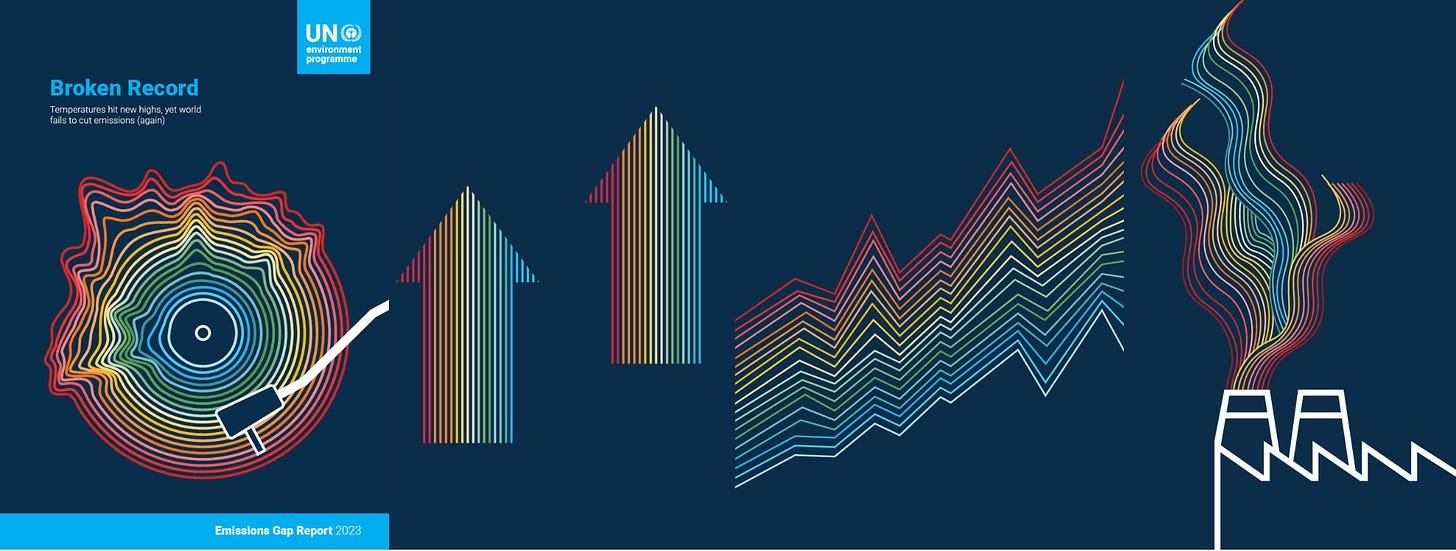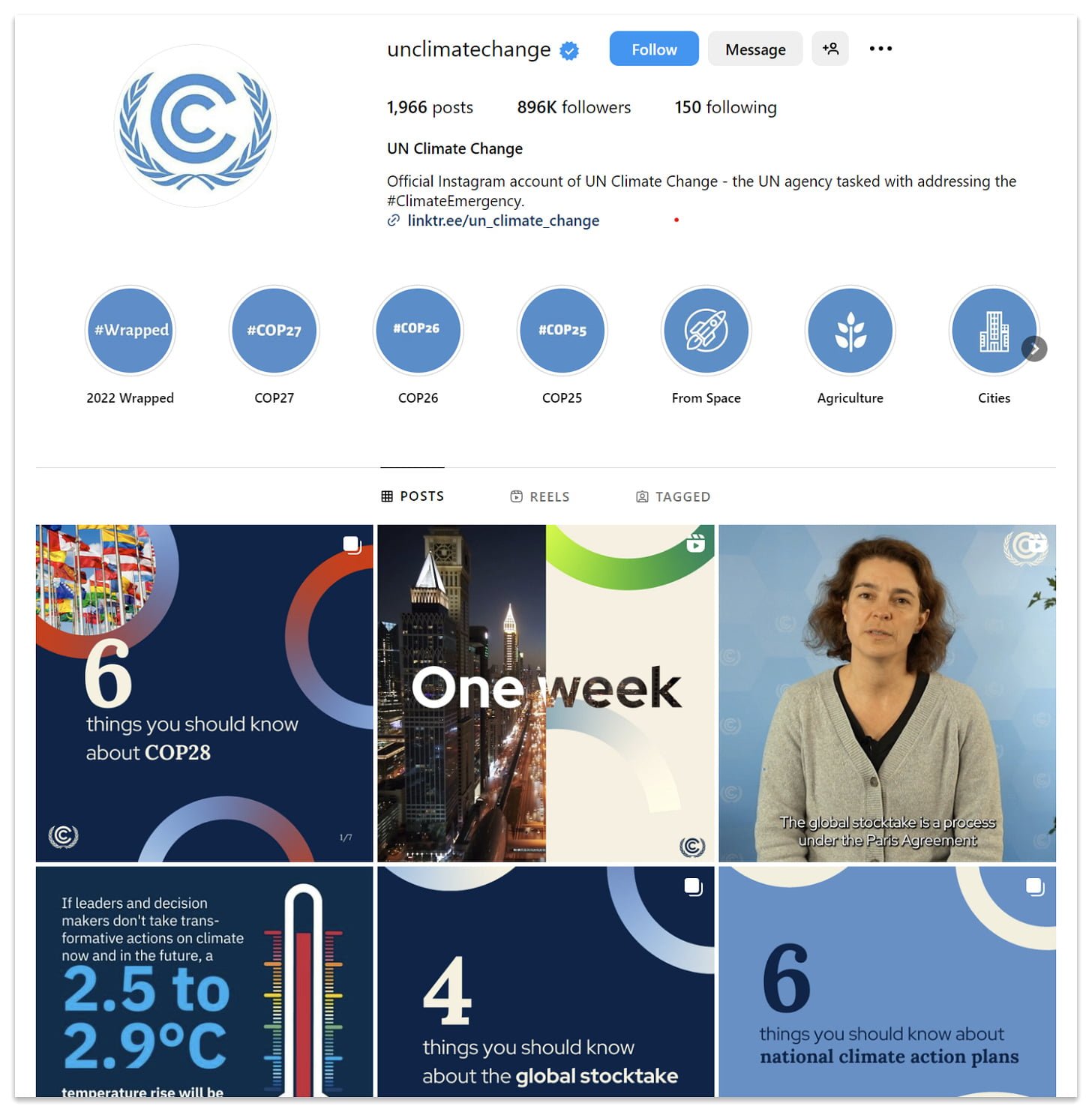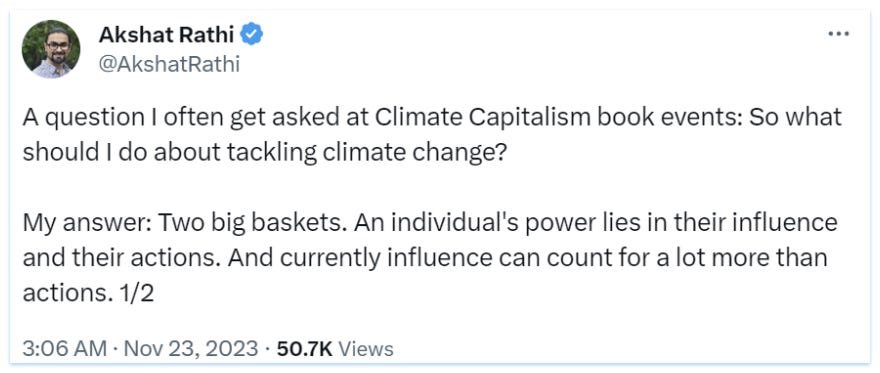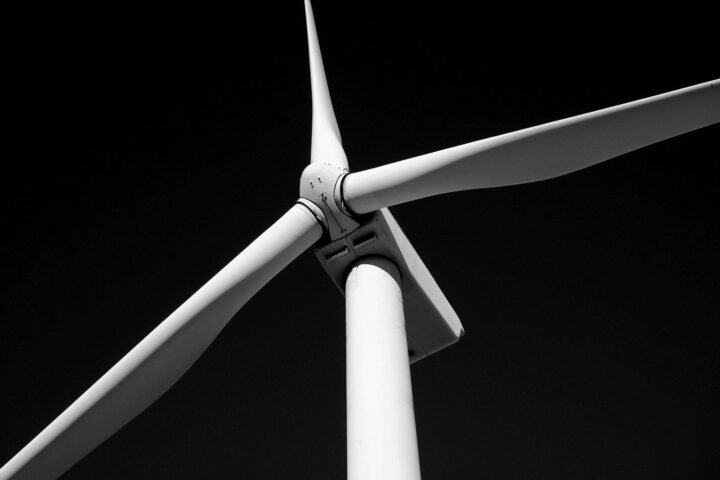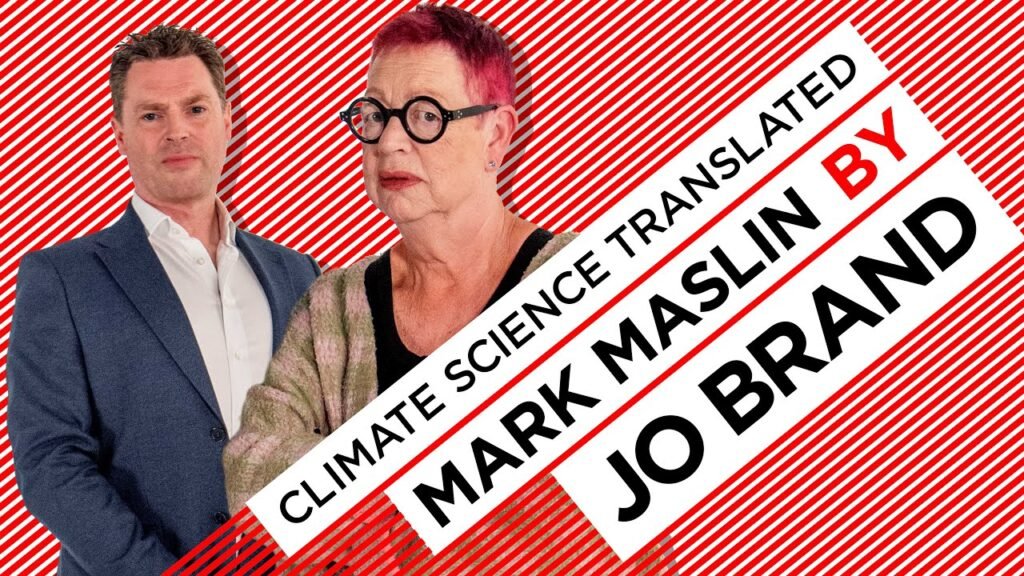1. Act Now
Dr. Kate Marvel (wiki), climate scientist at Project Drawdown and one of the authors of Fifth National Climate Assessment discussed in last week’s newsletter, in a New York Times Opinion piece: “While climate scientists were warning the world of disaster, a small army of scientists, engineers, policymakers and others were getting to work. These first responders have helped move us toward our climate goals. Our warnings did their job.”
2. Build Political Will
The Guardian on climate class warfare, this week:
“Billionaires are out of touch and much too powerful. The planet is in trouble”
“Of course working-class people care about the climate crisis: they emit the least, but will suffer most”
“The jet set: 200 celebrities’ aircraft have flown for combined total of 11 years since 2022”
See special #COP28 section below.
3. Eliminate Fossil Fuels
The richest 1% of the world’s population emit more carbon dioxide than the bottom 50%. A study by Oxfam found that the richest 1% depleted 12% of the world’s carbon budget, while the bottom 50% by income used just 5%. A wealth tax on the richest 1% is needed.
“Jeff Bezos pledged four years ago that Amazon would lead the way on carbon reduction. Since then, the firm’s emissions have risen by 40 percent — and its use of creative accounting suggests that the real figure is far higher.”
4. Speed up renewable energy
Electrek on US wind farms:
5. Shift towards sustainable transportation
Toyota’s Beyond Zero bullshit
6. Adopt planet-friendly agricultural practices
7. Eat a more climate friendly diet
8. Create sustainable cities and buildings
A study led by the Barcelona Institute for Global Health suggests that over 70,000 deaths in Europe during the summer of 2022 may be attributed to high temperatures, exceeding initial estimates. The research emphasizes the importance of using daily data, rather than weekly or monthly, for accurate assessments of heat-related mortality.
9. Protect and restore our environment
CNN’s new maps show that snowfall is declining globally due to rising temperatures. This is a major concern because snowpack is a crucial source of water for many people around the world. The decline in snowfall is also likely to disrupt ecosystems and agriculture.
10. Ensure global warming stays below dangerous limits
The Earth’s temperature spiked above 2°C for the first time in November 2023, a concerning sign of climate change.
Michael E. Man on why a recent Zero Emissions Commitment (ZEC) to warming study shows that we can still avert catastrophic climate change. This is because the oceans continue to draw carbon from the atmosphere, even after we stop emitting carbon. We can avert 1.5 degrees Celsius of warming if we reduce carbon emissions by 50% by 2030 and reach zero emissions by 2050.
🌐
In last week’s newsletter, we covered the release of US and UN climate assessments — Fifth National Climate Assessment and State of Climate Action 2023, respectively.
This week saw the release of the UN’s Emissions Gap Report 2023:
As global temperatures and greenhouse gas emissions break records, the latest Emissions Gap Report from the UN Environment Programme (UNEP) finds that current pledges under the Paris Agreement put the world on track for a 2.5-2.9°C temperature rise above pre-industrial levels this century, pointing to the urgent need for increased climate action.
The UN also released a very short video:
#COP28 — Starting this week on Thu Nov 30
COP28, the 28th Conference of the Parties to the United Nations Framework Convention on Climate Change, will be held in Dubai, United Arab Emirates, from November 30 to December 12, 2023.
$50 Billion: “here’s the latest snapshot of what 15 oil and gas companies operating in the U.S. earned for the third quarter of 2023” (nrdc.org)
“In numbers: The state of the climate ahead of Cop28” (climatehomenews.com)
“Five Key Narratives to Watch For at COP28” (desmog.com)
“Q&A: Why deals at COP28 to ‘triple renewables’ and ‘double efficiency’ are crucial for 1.5C” (carbonbrief.org)
“Whatever the U.S. says about a fossil fuel phaseout at COP28 is likely to be met with skepticism because of the country’s recent push to expand domestic oil and gas production and increase gas exports.”
Russia “oppose any provisions or outcomes that somehow discriminate or call for phase-out of any specific energy source or fossil fuel type” at COP 28.
Foreign Policy, “Why COP28 Could Be the Most Contentious in Years”:
AS OVER 75 PERCENT of global climate pollution comes from burning fossil fuels—which release carbon dioxide and methane, the two largest climate pollutants—one might expect that over the past three decades of global climate negotiations the international community would have reached some agreement on their future use. Not so. For decades, nations have disagreed vigorously about how and when to reduce fossil fuel emissions—and even whether ending reliance on coal, oil, and gas is necessary.
Substack Share of the Week
Videos of the week
“Today, in the age of imperialism, fossil fuels and carbon emissions have facilitated the hyper-exploitation of workers globally, all in the name of profits and capital accumulation. The end result of this relationship is climate change and massive emissions output.”
Are there any real alternatives?
Greenpeace is calling for a new economic model that prioritizes care and wellbeing, and highlights communities that are already practicing these alternatives.
“The Future is Degrowth: A Guide to a World Beyond Capitalism” (penguinrandomhouse.com)
https://en.wikipedia.org/wiki/Degrowth
🌐
“I’m Jo Brand — comedian — and if people like me have to get involved you know we’re in deep s**t.”
Link of the week
Official UN Climate Change Instagram account
From Social Media
About Us
We are a weekly Substack newsletter focusing on:
Progress in the fight against climate change,
Opportunities for individuals to make a difference.
Please follow, subscribe & share
Follow our WeCanFixClimateChange list on Twitter.
Read the full post at Substack - WCFCC.

